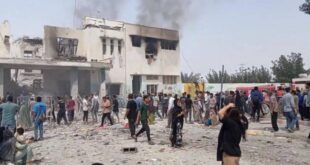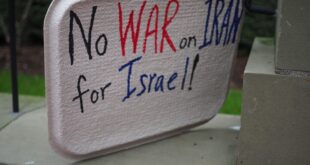 TEHRAN (FNA)- Iranian President Mahmoud Ahmadinejad in a radio interview said the United Nations’ nuclear watchdog agency offers “the best guarantee” that Iran can enrich uranium for peaceful uses, and said the United States “should cease putting pressure” on the agency.
TEHRAN (FNA)- Iranian President Mahmoud Ahmadinejad in a radio interview said the United Nations’ nuclear watchdog agency offers “the best guarantee” that Iran can enrich uranium for peaceful uses, and said the United States “should cease putting pressure” on the agency.
In an interview to be aired later on Tuesday on National Public Radio, Ahmadinejad also said diplomatic relations between Iran and the United States should advance, citing a willingness to cooperate on security in Iraq.
NPR released a transcript of the interview with Ahmadinejad, who is to address the UN General Assembly in New York this week.
Asked if Iran has a plan to reassure the world it intends to use its nuclear program for peaceful means only, Ahmadinejad said the United States should “extend at least the equivalent of one-tenth the cooperation we have extended” to the UN’s International Atomic Energy Agency.
“We believe that the IAEA itself offers the best guarantee,” he added.
Ahmadinejad said the US should stop pressuring the International Atomic Energy Agency over Iran’s nuclear activities.
It is only the Untied States and its European allies that are concerned about Iran’s nuclear case, President Ahmadinejad pointed out.
“The Non-Aligned Movement’s 118 member states have declared their commitment to our program and support it. And 57 member states of the Organization of the Islamic Conference have supported our position as well, ” he stated.
“You are speaking of only three or four countries, led by the United States and a couple of their European friends.”
“How is it that a country that possesses tens of thousands of nuclear bombs and has in fact actually used one against another nation is imposing its will on us? We are a country that is simply seeking peaceful nuclear energy,” the Iranian chief executive explained.
The United States believes Iran’s atomic program is aimed at making a bomb, but Iran says it is for peaceful energy purposes.
Ahmadinejad said it was “the policy approach of the US government that’s been non-responsive and must change. It is not our proposals that are going to fix the problem.”
The IAEA has released a report detailing Iran’s cooperation with the agency. in his latest report to the 35-nation Board of Governors, IAEA Director General Mohamed ElBaradei confirmed “the non-diversion” of nuclear material in Iran and added that the agency had found no “components of a nuclear weapon” or “related nuclear physics studies” in the country.
The IAEA report confirmed that Iran has managed to enrich uranium-235 to a level ‘less than 5 percent.’ Such a rate is consistent with the construction of a nuclear power plant. Nuclear arms production, meanwhile, requires an enrichment level of above 90 percent.
Iran is under three rounds of UN Security Council sanctions for turning down West’s calls to give up its right of uranium enrichment, saying the demand is politically tainted and illogical.
US is seeking to persuade major powers to consider a fourth round of UN sanctions against Iran to curb its nuclear program, but Russia and China have resisted more punitive measures.
Washington’s push for additional UN penalties contradicts a recent report by 16 US intelligence bodies that endorsed the civilian nature of Iran’s programs. Following the US National Intelligence Estimate (NIE) and similar reports by the IAEA head – one in November and the other one in February – which praised Iran’s truthfulness about key aspects of its past nuclear activities and announced settlement of outstanding issues with Tehran, any effort to impose further sanctions or launch military action against Iran seems to be completely irrational.
The February report by the UN nuclear watchdog, the International Atomic Energy Agency, praised Iran’s cooperation in clearing up all of the past questions over its nuclear program, vindicating Iran’s nuclear program and leaving no justification for any new UN sanctions.
On US-Iranian relations, Ahmadinejad said he has “taken lots of leaps forward in this respect,” adding, “I even said that I am prepared to talk at the United nations with them.”
He also said Iran “responded positively” to Washington’s request “to extend a hand of cooperation in a joint security commission involved in upholding a security force for Iraq. So we did whatever we could.”
Ahmadinejad also compared his proposal for a Palestinian referendum on the future of Israel, West Bank and Gaza Strip to the end of the Soviet Union.
“Let me create an analogy here – where exactly is the Soviet Union today? It did disappear – but exactly how? It was through the vote of its own people. So therefore in Palestine too we must allow the people, the Palestinians, to determine their own future,” he said.
Asked about Iran’s confrontation with the US-led West, Ahmadinejad replied, “I’d like to ask you, is it the Iranian (army) that’s around the territories around the country, or is it the US troops that are around?
“It is the US troops around our borders. It is not ours around the American borders. So what exactly are they doing over there?” he asked.
Ahmadinejad said, “We do not have any confrontation with anyone. We seek relations based on respect and justice.
“Why is it that the US administration and two or three groups that follow it allow themselves to speak for the world? We believe that that is the root cause of the confrontation. Simply because the US administration and a few number of its European allies believe that they own the world. They want to interfere in anything that goes on around the world.”
 Eurasia Press & News
Eurasia Press & News



